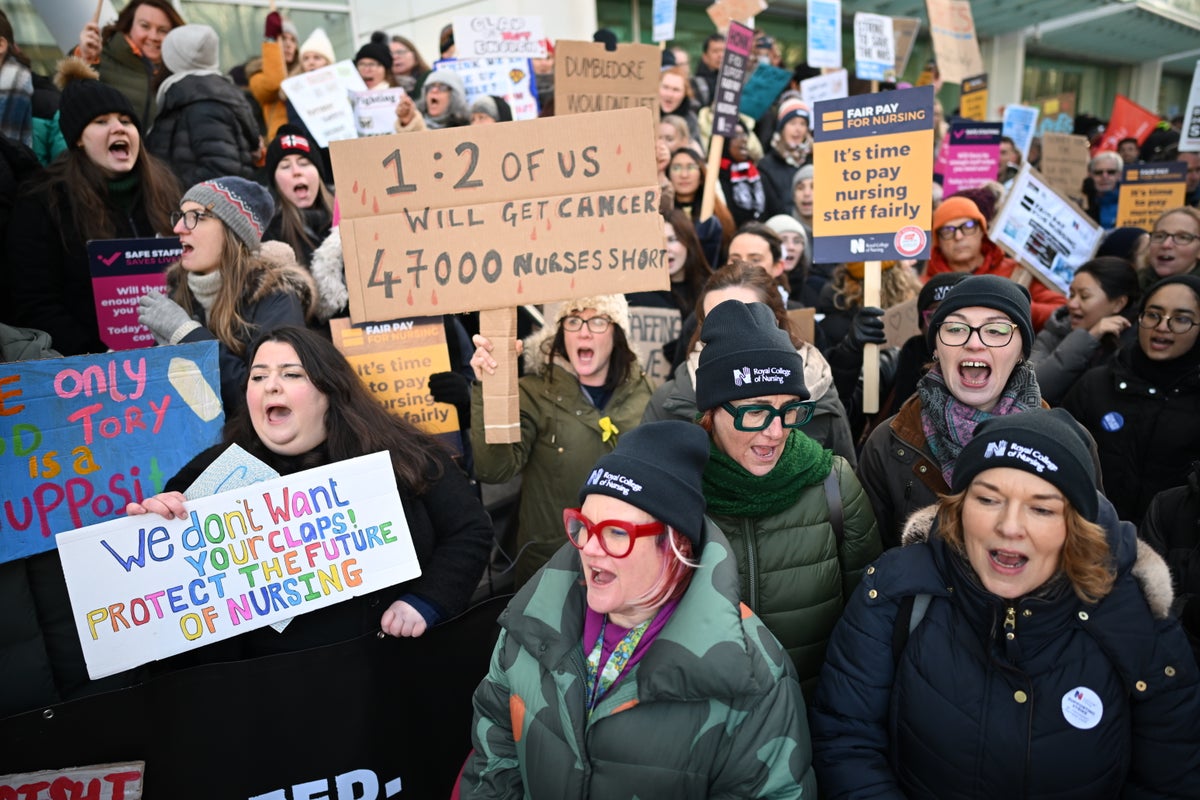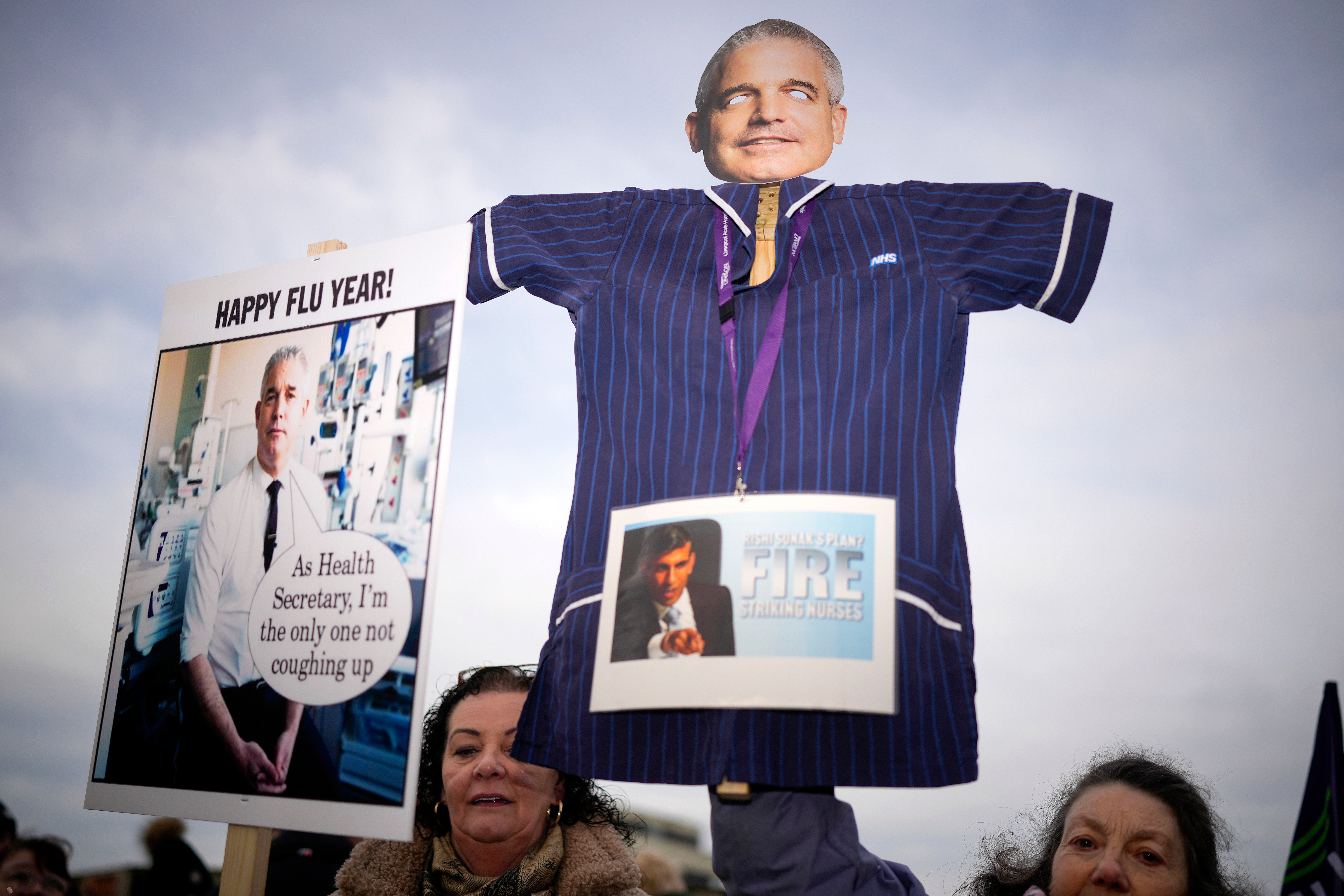
Nurses could refuse to carry out any further strikes alongside other health workers because of fears over patient safety, The Independent has learnt.
A mass walkout billed as the largest strike in NHS history is due to take place on Monday as tens of thousands of nurses, paramedics and 999 call handlers walk out in a bid to force ministers to the negotiating table.
But the coordinated strikes could be a one-off if nurses feel that the decision to take part in direct action compromises patient safety, The Independent has been told.
One union source said walkouts are not carried out on a “come what may” basis, and that the unions would have to assess whether striking together was “helpful” or not.
Unions have been escalating their industrial action in recent weeks in an attempt to secure higher pay rises. Any de-escalation in tactics will be seen as a blow to their campaign and a boost to Rishi Sunak’s hopes of riding out the wave of protests.
With patient safety the priority, sources insisted there are strong local controls that will pull nurses from picket lines if they think there is an issue.
“Let’s see what happens on Monday and Tuesday and whether having other [health] professions out at the same time was a helpful impact or not,” one source said. “It is always about patient safety.”
On the coordinated action, the union source added: “We will review what the additional impact has been of having other professions [on strike at the same time].”
He added that his union has very tight rules that operate on a local level. If local committees decide there is a risk to patients because of their strike or strikes by others, “they will just call it off or they will derogate other people from the picket line and tell them, ‘You have to go in I’m afraid.’
“There is a very careful way to manage patient safety risk, and then the strike is changed or broken. It is not this hard rule of ‘strike come what may’.”
A senior health source said coordinated strikes among healthcare workers were actually an “accident” rather than deliberate, and that there wasn’t a “conscious strategy” over industrial action.
In January, Pat Cullen, the general secretary of the Royal College of Nursing (RCN), told The Independent: “We have no plans to coordinate strikes with any other part of health and [social] care. It is not in our agenda because we have to be mindful that safety is paramount in all of our decision-making.”
An RCN spokesperson said that the union has “our own mandate” and that it had chosen the days on which its members would take part in strikes, adding that its members have a mandate to take strike action for another 100 days.
The nursing union believes that the ultimate responsibility for patient safety lies with the government, arguing that nurses are striking to ensure safe staffing and safe patient care in the NHS.

Strikes in Wales were called off on Friday after the Welsh government made a new pay offer to unions, putting more pressure on Westminster to engage. One union source said that it was “getting harder to agree derogations” compared with the situation before Christmas.
“There is a sense that staff attitudes are hardening a bit, and derogations aren’t as easy to agree. I think some staff are being clear they’ll work [the number of hours they would normally work on] a bank holiday, but they won’t necessarily agree to [provide] anything above a bank holiday service,” they said.
“Members of the unions are starting to push back a little. It’s not in every trust, but in some, some of the goodwill – and derogations rely on goodwill – some of that is ebbing away, and I think that’s true on the hospital side and the ambulance side.”
Addressing Monday’s strikes, the source said: “On a human level, people will wait longer, people will be in pain a bit longer, people’s operations will be cancelled, whereas perhaps before Christmas they might have not been cancelled.
“I think it is a sign that the impact of strikes is going to increase, and that’s before we’ve even got to the junior doctors. If they strike for two days in March, the disruption of that is going to be enormous. Elective care will be cancelled on a much bigger [scale], and that will [affect] every trust, we’re predicting.”

RCN director for England Patricia Marquis appealed to Mr Sunak to “come to the table” for pay talks in order to avert more strike action. “Where there are genuine negotiations with a view to seeking a resolution, then we will call off the strikes,” she told Times Radio.
Business secretary Grant Shapps said on Sunday that he is concerned that the planned strike by ambulance staff on Monday will put lives at risk.
Mr Shapps said the RCN had “very responsibly” told the NHS about where they will be striking, enabling emergency cover to be put in place – but claimed that Unite, Unison and the GMB union, representing ambulance workers, had not provided such information.
Unite general secretary Sharon Graham accused Mr Shapps of lying about the provision of minimum cover during industrial action. “The idea that he is saying that ambulance workers did not do minimum cover in the dispute is an absolute utter lie,” she told the BBC.
Meanwhile, Labour’s shadow business secretary Jonathan Reynolds suggested that a Labour government would not be able to offer double-digit pay rises to public-sector workers.
Asked if his party would give nurses a 10 per cent pay rise, Mr Reynolds told Sky News: “Realistically, the top opening offer, we probably wouldn’t be able to meet that – but we would negotiate.”







